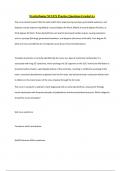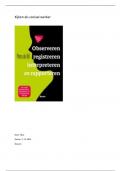Exam (elaborations)
Dysrhythmias NCLEX Practice Questions Graded A+
- Institution
- Dysrhythmias NCLEX Practice Questions Graded A+
Dysrhythmias NCLEX Practice Questions Graded A+ The nurse should suspect that the older adult client experiencing syncope, generalized weakness, and dyspnea may be experiencing Mobitz I second-degree AV block, Mobitz II second-degree AV block, or third-degree AV block. These dysrhythmias can ...
[Show more]




